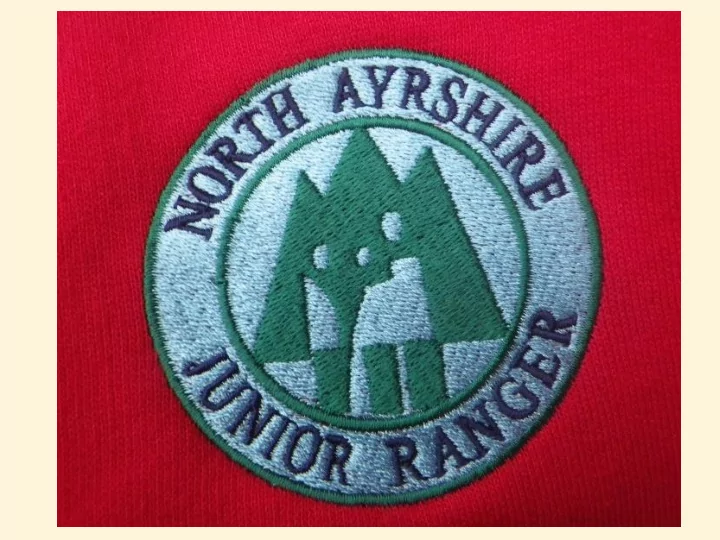

Junior Ranger Key Principles • Delivered by Scottish Countryside Rangers in conjunction with local partners • Welcomes all young people aged 11-18 to take part in enjoyable, inspirational and relevant outdoor learning experiences • Provides opportunities to develop transferable understanding, experience and skills of the Ranger profession • Junior Ranger Award is integral part of the activities, though not compulsory
Where to start? How? SCRA toolkit, Project brief Who? Acorn Club leavers, word of mouth, Facebook, Friends of Eglinton When? Sundays, once a month, 1.00-4.00pm, three hours to allow time for practical tasks Where? Eglinton Country Park, and localities throughout North Ayrshire Buy PPE, Kelly kettle, notebooks, hoodies with Junior Ranger logo
Varied Programme of activities • Follows SCRA key principles of Junior Ranger Programme • Allows Junior Ranger Award competencies to be achieved But also: • Fulfils Council strategic priorities • Completes tasks from Ranger Service Action Plan • Curriculum for Excellence: Four Capacities, Health & Wellbeing • Links to other awards: Duke of Edinburgh, John Muir etc
Early stages
A – Know your site: A1 – Develop knowledge of key features of your site
A – Know your site: A2 – Conduct a site survey (Identification & recording)
B – Care for your site: B1 – Carry out a practical task (Management techniques & tools)
C – Care for visitors: C1 – Local Access Issues; Scottish Outdoor Access Code
C – Care for visitors: C2 – Use of Basic Navigation Skills
C – Care for visitors: C3 – Emergency Situation, including First Aid
D – Events and Interpretation D1 – Assist in Ranger activity/event/display for public
E – Working With Others E1 – Positive working relationships with others
E – Working With Others E1 – Positive working relationships with others
Junior Ranger Award Recording the evidence
Feedback Junior Rangers Parents/carers “I have enjoyed learning about the “I think (know) A gets great enjoyment out environment and how to use tools. I of coming along to Rangers, plus she like helping Eglinton Park because I learns lots about the richness of the love to come here often ” outdoors, loads of practical skills, and it makes her think actively why we should “I have enjoyed the team building and care for it and appreciate it. Plus she gets practical tasks for example the bird the good of being out in all weathers! feeders. I enjoyed that as it taught me “ Provides safe environment to learn and new skills and allowed me to meet the group” develop social skills and confidence as well as educating about nature” “I enjoy coming to Junior Rangers as it “From my perspective, the Junior Ranger is a good way to wind down and spend time away from technology” programme is invaluable. Teaching and learning new skills & experiences. It has “I liked the group work and working been a fantastic way of getting B out and with people I wouldn’t usually work involved in the community” with. I loved the biscuit choice – more Hobnobs!” “Activities varied and interesting”
Volunteer feedback “I loved to see the impact we made in just one afternoon” “Really productive day with lots of enthusiasm and job satisfaction” “Was great to work as a team clearing areas of the pond”
About me • I started in October 2016 • I wanted an understanding of what being a ranger is like. • To be involved with my local community. • To gain practical experience. • To have fun.
The award from my perspective • Beneficial • Manageable • Enjoyable
Skills I’ve gained • Surveying • Species Identification • Navigation • First Aid • Birdhouse Making • Pony-Catching • Communication • Team Working/ Leading • Decision Making • Planning and Organising • Problem Solving
Example Activity- Habitat Management B1.1 – Practical Management Techniques What did we have to do? Why we did we do it? What was the result?
Next Steps • Modern Apprentice • Assist with Junior Rangers • Leadership award
Recommend
More recommend